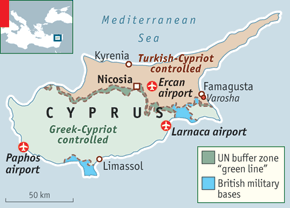Long talks have got little nearer to solving Europe’s oldest “frozen conflict”
Mar 31st 2011 | NICOSIA | from the print edition
 GLOOM has settled over the Cyprus talks. Under a UN special envoy, Alexander Downer, the Greek-Cypriot president (Demetris Christofias) and his Turkish-Cypriot counterpart (Dervish Eroglu since March 2010), have held 100 meetings since September 2008. But politics intrudes: general elections are due in Cyprus (in May) and Turkey (June). Attention will then switch to Cyprus’s European Union presidency in 2012 and its presidential election early in 2013.
GLOOM has settled over the Cyprus talks. Under a UN special envoy, Alexander Downer, the Greek-Cypriot president (Demetris Christofias) and his Turkish-Cypriot counterpart (Dervish Eroglu since March 2010), have held 100 meetings since September 2008. But politics intrudes: general elections are due in Cyprus (in May) and Turkey (June). Attention will then switch to Cyprus’s European Union presidency in 2012 and its presidential election early in 2013.
After meeting the two leaders in Geneva in January, the UN secretary-general, Ban Ki-moon, expressed grave concern about the talks’ slow progress. Yet Mr Downer, a former Australian foreign minister, is breezily upbeat. He told an Economist Cyprus conference last month that more had been achieved than was widely realised. He noted broad agreement on such long-term issues as the structure of a federated Cyprus. The toughest disputes are all short term: property, territory and security. Yet Mr Downer says the real question is not whether a deal is possible but whether the two sides truly want one.
And this is where pessimism kicks in. Mr Christofias baldly told the same conference that “progress has been zero since Mr Eroglu was elected.” He preferred dealing with the man whom Mr Eroglu defeated, Mehmet Ali Talat. His negotiator, George Iacovou, thinks Turkey does not want a deal at present. Most of the Greek-Cypriot media are rejectionist. Turkish-Cypriots have staged protests against Turkey, their sponsor, but these have mostly fizzled. Mr Eroglu’s negotiator, Kudret Ozersay, says that “everyone wants peace, but not everyone wants a compromise.” Without more progress, he adds, he might quit.
The talks cannot go on for ever. Time is making them harder. Younger Cypriots have no memory of a united island and the “green line” is coming to look like permanent partition. Mr Christofias seems ready to run again in 2013 if there is a chance of a deal. But without clearer signs of progress, he could well lose—just as Mr Talat did. Is there scope for unilateral gestures? The International Crisis Group suggests several, including Turkey opening its ports to Cypriot trade, Cyprus allowing charter flights to Ercan airport in the north or a supervised return of the ghost resort of Varosha to its Greek-Cypriot owners. But in today’s bitter climate, none looks feasible.
What if there is no deal? Many Greek-Cypriots shrug their shoulders: they are now in the EU and the euro. But Mr Downer warns those who want the talks to fail to be careful what they wish for. The economy suffers from the island’s division. And a failure to settle the Cyprus problem can only make Turkey’s strained relations with the EU worse. Sadly, there is little the EU can do about this. It is perhaps telling that the Greek for give and take is “take and give”.
from the print edition | Europe
via The insoluble Cyprus problem: Sad island story | The Economist.


Leave a Reply